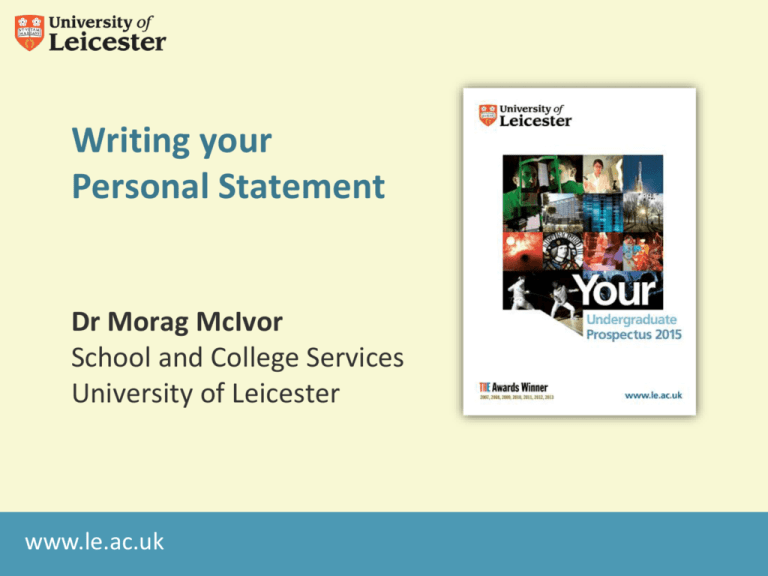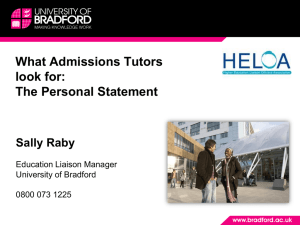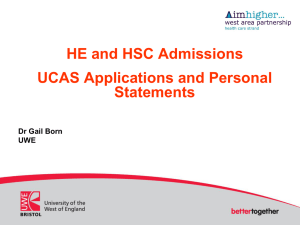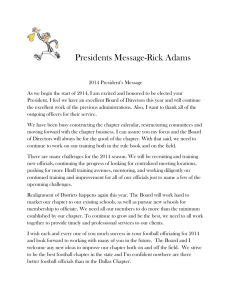Personal Statement
advertisement

Writing your Personal Statement Dr Morag McIvor School and College Services University of Leicester www.le.ac.uk Three quick questions…! How many applicants plagiarised in their personal statement in 2010? A. 1,722 B. 13,568 C. 29,228 C. 29,228 How many applicants started their personal statement in 2010 with ‘For as long as I can remember, I have been B. 166 interested in…’? A. 54 B. 166 C. 2,701 How many people applied to UCAS in C. 653,600 2012? A. 47,900 B. 519,721 C. 653,600 Writing Your Personal Statement Outcomes • Understand the essentials of a personal statement. • Understand the technicalities of a personal statement. • Examine and evaluate personal statements. Personal Statements: do they matter? • Vital for some courses • Important for others • Relevant at the margin for others • Always just one part of the selection process Selection process • A* at A level • Reference • Unit grades • Predicted grades • UMS marks • Interview • Differentiation by A level • Audition subject – “soft” and “hard” A • Portfolio inspection levels • Essay/assignment • GCSE achievement • Generic admissions tests • Extended Project • Subject-specific admissions • Personal statement tests Who decides? • Academic staff • Departmental administrators • Central administrators How do they decide? • Own personal judgement • Check-list of criteria Personal Statement: the essentials • Why do you want to study the course? – Have you enjoyed studying the subject before? – Have you read around the subject beyond your studies? – What relevant skills do you have from your current studies? – Have you any relevant experience – work or voluntary? – What do you hope to get out of the course? – What are your career aspirations? • Outside interests – music, travel, community work, sports – what skills have you gained from these and how do they relate to your chosen course? • Any exceptional circumstances? • Why are you taking a year out? • Try to stand out (in a good way!) Personal Statement: the technicalities • Apply online at UCAS • You can enter up to 4,000 characters (this includes spaces) or 47 lines of text (this includes blank lines), whichever comes first. • You do not have to use all the space provided. • When you save text, the system will tell you how many characters are still available or if you have used too many characters. • You can preview your statement after you have saved it. • UCAS uses a Similarity Detection Service Entry profiles English: University of Leicester EP Teaching, learning and assessment Teaching within the School makes use of traditional methods and the latest technology to offer you a variety of learning experiences. Lectures, given by subject specialists, are designed to introduce you to important debates and contexts for understanding an author’s work. Weekly seminars, in which a tutor leads a small group of students in discussion, will allow you to explore a text or topic in depth. The School ensures that full-time, permanent staff do a large proportion of the seminar teaching in all three years, including the introductory modules. Your fellow students will support you (and you them) in autonomous learning groups, which run parallel with some of your seminars. Each term you will study three modules. In a typical week for each of your three modules you will attend a seminar and either one or two lectures, along with a number of additional events such as workshops on research and study skills, learning groups, and introduced film screenings. For your third-year dissertation you receive one-to-one tuition across the term from a tutor with an interest in your chosen subject. You will be assessed through a combination of essays, group work, oral presentations, review writing and portfolios - as well as exams. Your final degree result will be based on the work you do in the second and third years of your degree. The assessments across the three years are designed to help you build confidence in a range of skills and to provide prospective employers with evidence that you can work effectively both as an independent researcher and as a team member. Chemistry – Loughborough University EP Course information The broad base of the Chemistry course allows students to take up careers in all areas of chemical science as well as non-chemistry careers. In Years 1 and 2 the main core areas of inorganic, organic and physical chemistry form the backbone of the course, with additional modules in spectroscopy, analytical chemistry, biological chemistry, mathematics and polymer chemistry. Laboratory classes, workshops and seminars support these lectures. After Year 2, the development of core chemistry continues along with optional topics which include drugs and disease and radiochemistry. In Year 4 you will also undertake an individual research project in a subject area of your choice. In Year 4 you will study advanced research techniques that are complemented with further advanced modules in chemistry, and an extended research project equivalent to six modules where you will have the opportunity to work in the research laboratories. Advice from an Admissions Tutor "Writing the Personal Statement is a challenging task: within a relatively short space you need to present yourself as the type of person I would want to teach as a student. Clearly, your academic performance is very important but it only tells me about one aspect of you as a person. Why do you want to study my subject at university? What is it that really fires your enthusiasm and means that you won’t just go through the motions, but will actually want to learn about the subject for its own sake? Writing answers to these questions will take you a long way, but what I also want to see is how you have demonstrated this enthusiasm already; how you have gone out of your way to expose yourself to the subject in ways above and beyond the basics of the courses you are being taught at school or college and, importantly, what you learnt as a result of doing that. I also want you to tell me about you as a real, three-dimensional person. If you are the queen of salsa or play in the local rugby team, tell me about it and how you motivate yourself to do things and fit them all together in your daily life. But above all else, be an enthusiast, both for what you are doing now and also for where you see your future taking you." Dr Jon Scott, Senior Lecturer and Admissions Tutor for Biological Sciences More advice… "Don't just tell us that you find a subject interesting: pick an example (a scene from a novel, perhaps, or a production of a play you've seen) and write a bit about how it works, and what interests you about it. Some of the best personal statements I've read have been quite straightforward in their language, but show genuine commitment towards reading as a worthwhile, stimulating and intellectually challenging activity." Dr Mary Ann Lund (English) "Evidence is the key. If a student can provide evidence this makes their statement very much stronger. For example, things like volunteering work in schools, relevant work experience, perhaps science or astronomy clubs, or work with the Institute of Physics would all be impressive evidence of passion and motivation for Physics. We’re also interested in interests and achievements outside of the curriculum - so things like Duke of Edinburgh awards, membership of sports clubs, or involvement in plays, bands etc. tend to read well." Dr Mervyn Roy (Physics) Judge for yourselves… Criminology “From watching and reading Sherlock Holmes, Cracker, CSI and Crime watch, my interest in criminology has developed. Criminology has always had a glamorous image but it is more than that it deals with criminals and supports the justice system. Criminology is all about crime and punishment. It is an exciting inter-disciplinary subject which draws on Sociology, Psychology and Law to help examine how crime is defined, why people commit crimes, and how society responds to crimes.” Criminology “From watching and reading Sherlock Holmes, Cracker, CSI and Crime watch, my interest in criminology has developed. I became intrigued to find out the reality behind the glamour and excitement of these portrayals of crime and the criminal justice system. My research led to me to attend a lecture by Dr Lisa Smith entitled, ‘The CSI Effect: Forensic Science in the Popular Media’, which considered whether the inaccurate portrayal of forensic science in fiction is having an impact on the real life criminal justice system.” Management Studies “Having been a Nottingham Forest supporter for the majority of my life, I have always wondered how such an illustrious club full of history has not played top-flight football for the best part of ten years and are now currently in the lower regions of the football league. It could well be the fact that past managers making poor decisions has resulted in Forest's failure, in an attempt to bring back the glory years under the leadership of the great Brian Clough. This is where my fascination for management began. Having studied Business Studies since GCSE level, my interest of the subject has been extended to A-level. As well as Business Studies, my other subjects at A-level include Computing and General Studies, along with English Literature at AS-level. Having enjoyed Business Studies during my AS-levels, I feel that the people and operations module was the most interesting in my opinion. In particular, the methods of motivation businesses use to keep their staff happy and the different types of leadership management used such as McGregor's theory. Using these theories to compare how successful companies are at keeping their staff motivated has encouraged me to study business at degree level. My love for sport, particularly football, is backed up by being selected for the 6th form 1st team at left back. I also play football outside school, having played for my local football team, Great Gonerby Youth Football club, from 2002 to 2006. I currently play for a team close to where my father lives, Southwell City under 18's. Playing for a football team has made me realise how important it is to be able to work in a team and to be able to communicate well with others.” Management “Having been a Nottingham Forest supporter for the majority of my life, I have always wondered how such an illustrious club full of history has not played top-flight football for the best part of ten years and are now currently in the lower regions of the football league. This is what led to my fascination for management as I considered how and why Forest’s successive managers failed, which prompted me to read F. W. Taylor’s ‘The Principles of Scientific Management’. From this, I gained an appreciation of the importance of improving and developing the management system rather than relying on ‘extraordinary men’ or, in Forest’s case, players or coaches. Stemming from this interest in the role of the individual in management systems, I have found the people and operations module of my A Level in Business Studies the most interesting. In particular, the methods of motivation businesses use to keep their staff happy and the different types of leadership management used, such as McGregor's theory. Using these theories to identify how successful companies are at keeping their staff motivated has encouraged me to focus on management studies at degree level. I am a keen footballer and play for both my school team and South City under 18's. Playing for a football team has made me realise how important it is to be able to work in a team and to be able to communicate well with others, key skills for the world of management.” History “...out of the darkness loomed the silent majesty of the Forum”. A bit cheesy I know but I wanted to convey the excitement I felt on visiting Rome. That first evening, I walked the Appian Way and there stood the Forum. It was real! For the last 5 years or so, I have had a fascination for the Roman Empire and especially for its military history. I have often pondered on how the political map of today has been set by the decisions military leaders took on the battlefield a thousand years ago.” History “On the first evening of my visit to Rome I walked the Appian Way and there, out of the darkness, stood the Forum. Having read Michael Crawford’s The Roman Republic and William Harris’s highly controversial War and Imperialism in Republican Rome, 327-70 B.C, I wanted to see the Forum for myself. The excitement that I felt at that moment, finally seeing the heart of the Roman Empire, brought to life my fascination for Roman military history and cemented my appreciation of the impact that the Roman Empire had on the political map of today.” Economics “Examination of any quality newspaper will probably demonstrate that more of the headlines address economic problems than any other topic. The importance and relevance of economics and related disciplines to the modern world have led me to want to pursue the study of the subject at a higher level. I am particularly interested in the behavior of firms and organizations from an economic standpoint. During my study, I have come across many real life complexities and, while attempting to apply theoretical ideas, I have developed a keen interest in analyzing and understanding how the world of business is influenced by economics.” Economics “Examination of any quality newspaper will probably demonstrate that more of the headlines address economic problems than any other topic. The importance and relevance of economics and related disciplines to the modern world have led me to want to pursue the study of the subject at a higher level. I am particularly interested in the behaviour of firms and organisations from an economic standpoint. My work experience placement at Goldman Sachs gave me the opportunity to see an investment bank from the inside, which complemented my A-level module on Financial Markets and Monetary Policy. I particularly enjoyed attempting to apply the theoretical ideas I had learnt to the real life complexities I experienced during the work placement, such as the on-going attempt to resolve the conflict between the bank’s three objectives of liquidity, profitability and security.” Do Don't Ensure it is well written with correct grammar and spelling. Create a clear structure to your work to enable the reader to easily follow your argument. Explain why you want to dedicate yourself to the study of your chosen topic. Provide lists of things without explaining why they are relevant. Submit a single block of text as that can make your work difficult to read. Use quotes or examples you found online. Every year admissions tutors see recycled ideas that are remarkably similar to several other applicants. Show how you've pursued your interest outside the school/college syllabus. Use examples from your own personal experiences to illustrate your skills. Plagiarise. Liaise with the teacher who is writing your reference so that your work compliments one another. Mention issues that you think an admissions tutor needs to take into consideration when assessing your application Refer to particular universities or courses by name as each tutor will think that your preferred option is theirs unless you indicate otherwise! Define the subject. Rather show what you understand and find interesting about it. Personal Statements in summary: • A clear well-written statement • Academic ability • Enthusiasm – clear reasons for wanting to study the course • An understanding of the subject • Application / evidence of your knowledge, skills and motivation • Write positively, concisely and honestly in your own words • Draft, redraft, check and check again! Quick Quiz! Where should you go on the UCAS website to find out more information about the skills needed for your course? Name 3 things universities consider in the selection process? UCAS Entry Profiles GCSEs, admissions tests, essays, auditions, portfolios, EPQs, unit grades etc









